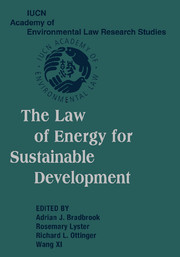Book contents
- Frontmatter
- Contents
- Acknowledgments
- Message from Kofi A. Annan, Secretary-General, United Nations
- Introduction – A Global Learned Society to Address Earth's Evolution: The IUCN Academy of Environmental Law
- Public Lectures on International Environmental Law
- PART ONE SUSTAINABLE DEVELOPMENT AND THE ROLE OF ENERGY LAW
- PART TWO LEGAL ISSUES IN CONTEMPORARY ENERGY LAW
- PART THREE INTERNATIONAL ENERGY LAW
- PART FOUR COMPARATIVE ENERGY LAW
- 18 UNDP: China's Energy Portfolio
- 19 Implementing the Kyoto Protocol beyond the WSSD at Johannesburg – The Japanese Perspective
- 20 Strategy, Policy, and Law Promoting Renewable Energy Resources in China
- 21 Energy Development and Utilization in Africa
- 22 European Energy Law Initiatives
- 23 The Law of Energy for Sustainable Development in Britain
- PART FIVE ELECTRICITY RESTRUCTURING
- PART SIX FINANCING FOR SUSTAINABLE ENERGY
- PART SEVEN CIVIL SOCIETY AND THE PROCEDURAL REQUIREMENTS OF ENERGY LAW FOR SUSTAINABLE DEVELOPMENT
- Index
21 - Energy Development and Utilization in Africa
Published online by Cambridge University Press: 10 August 2009
- Frontmatter
- Contents
- Acknowledgments
- Message from Kofi A. Annan, Secretary-General, United Nations
- Introduction – A Global Learned Society to Address Earth's Evolution: The IUCN Academy of Environmental Law
- Public Lectures on International Environmental Law
- PART ONE SUSTAINABLE DEVELOPMENT AND THE ROLE OF ENERGY LAW
- PART TWO LEGAL ISSUES IN CONTEMPORARY ENERGY LAW
- PART THREE INTERNATIONAL ENERGY LAW
- PART FOUR COMPARATIVE ENERGY LAW
- 18 UNDP: China's Energy Portfolio
- 19 Implementing the Kyoto Protocol beyond the WSSD at Johannesburg – The Japanese Perspective
- 20 Strategy, Policy, and Law Promoting Renewable Energy Resources in China
- 21 Energy Development and Utilization in Africa
- 22 European Energy Law Initiatives
- 23 The Law of Energy for Sustainable Development in Britain
- PART FIVE ELECTRICITY RESTRUCTURING
- PART SIX FINANCING FOR SUSTAINABLE ENERGY
- PART SEVEN CIVIL SOCIETY AND THE PROCEDURAL REQUIREMENTS OF ENERGY LAW FOR SUSTAINABLE DEVELOPMENT
- Index
Summary
BACKGROUND
In Africa, as in many parts of the developing world, the lack of clean and reasonably priced energy is a significant impediment to sustainable development and a principal contributor to a host of environmental and social problems, particularly health problems. While approximately forty percent of the world's peoples lack modern energy services, in Africa the number exceeds eighty percent. In fact, the vast majority of African peoples rely on wood, dung, and other biomass fuels for cooking and heating and use such fuels in polluting and inefficient ways. Moreover, these energy sources are equally under threat from overuse, creating additional environmental challenges. In percentage terms, it is estimated that at least eight out of every ten Africans have no access to electricity. Table 12.1 provides comparative data on access to electricity services for some African populations. Approximately fourteen percent of the world's population lives in Africa, and as Africa's population is growing far more rapidly than rural access to electricity services, the emerging energy crisis is perhaps only better left to the imagination.
There is, however, abundant energy resource wealth in Africa, most particularly petroleum as a source of commercial energy. However, energy resources are unevenly distributed: two-thirds are located in North Africa, in Algeria, Libya, and Egypt; the remaining one-third in sub-Saharan Africa, with a near monopoly held by Nigeria and Angola.
- Type
- Chapter
- Information
- The Law of Energy for Sustainable Development , pp. 324 - 369Publisher: Cambridge University PressPrint publication year: 2005

